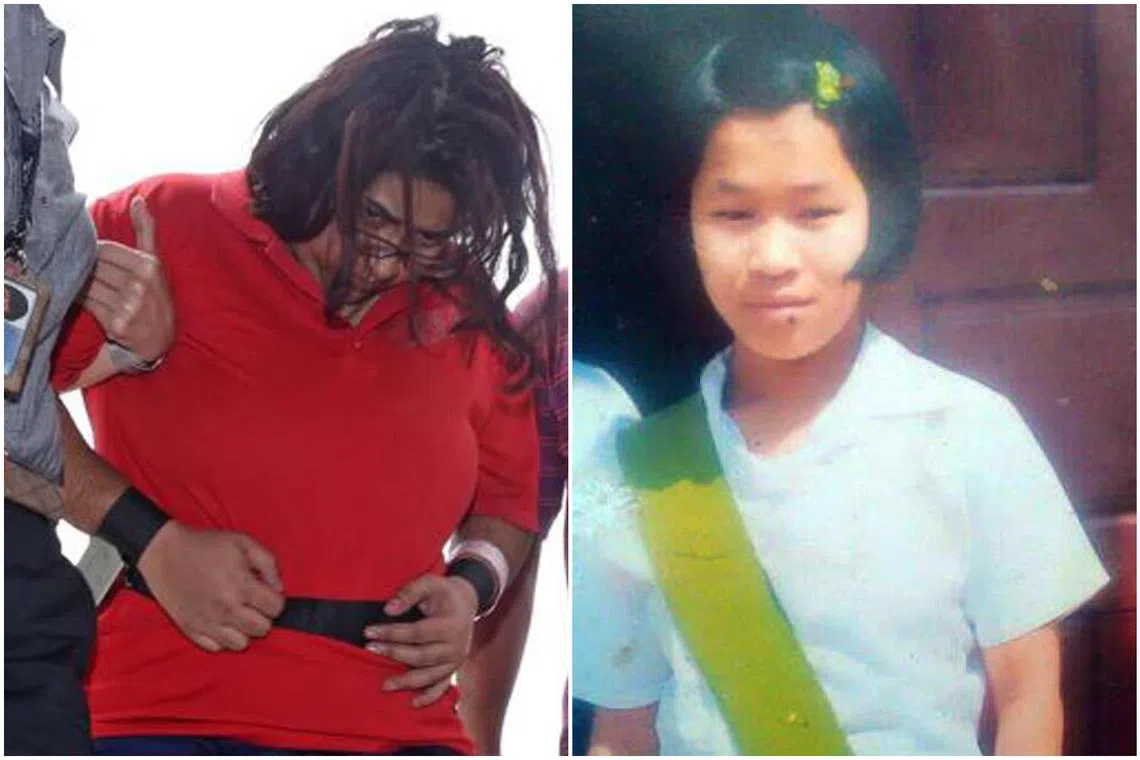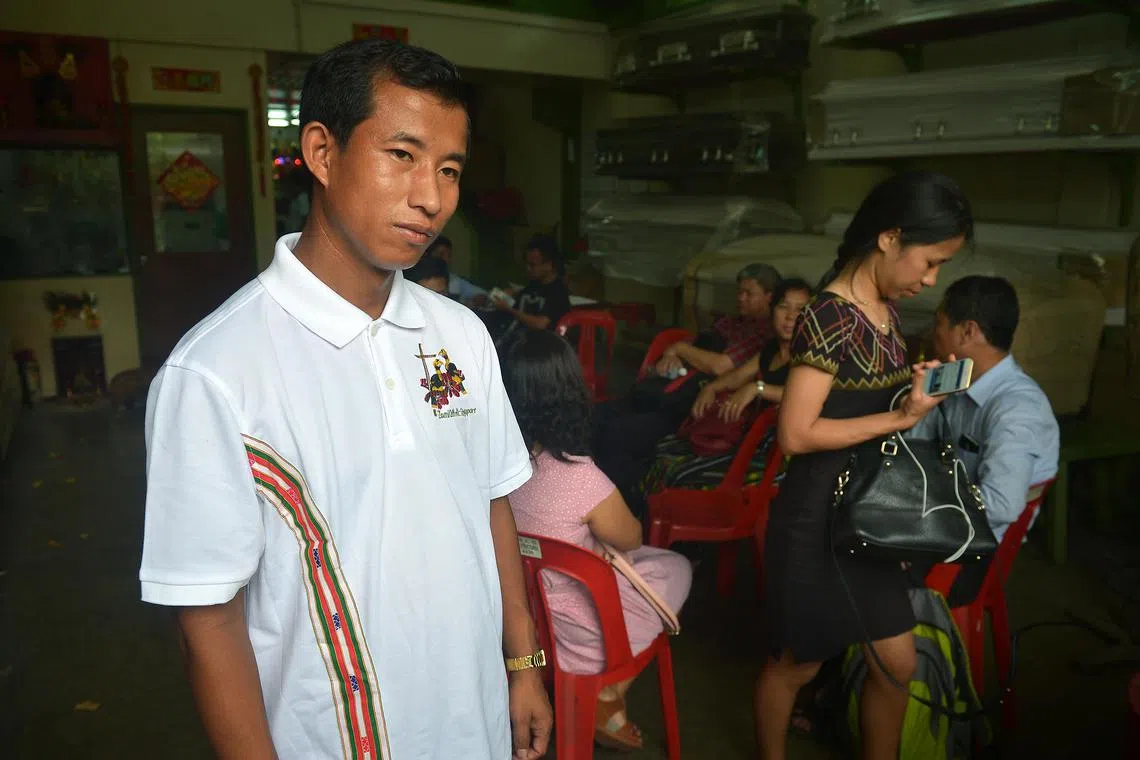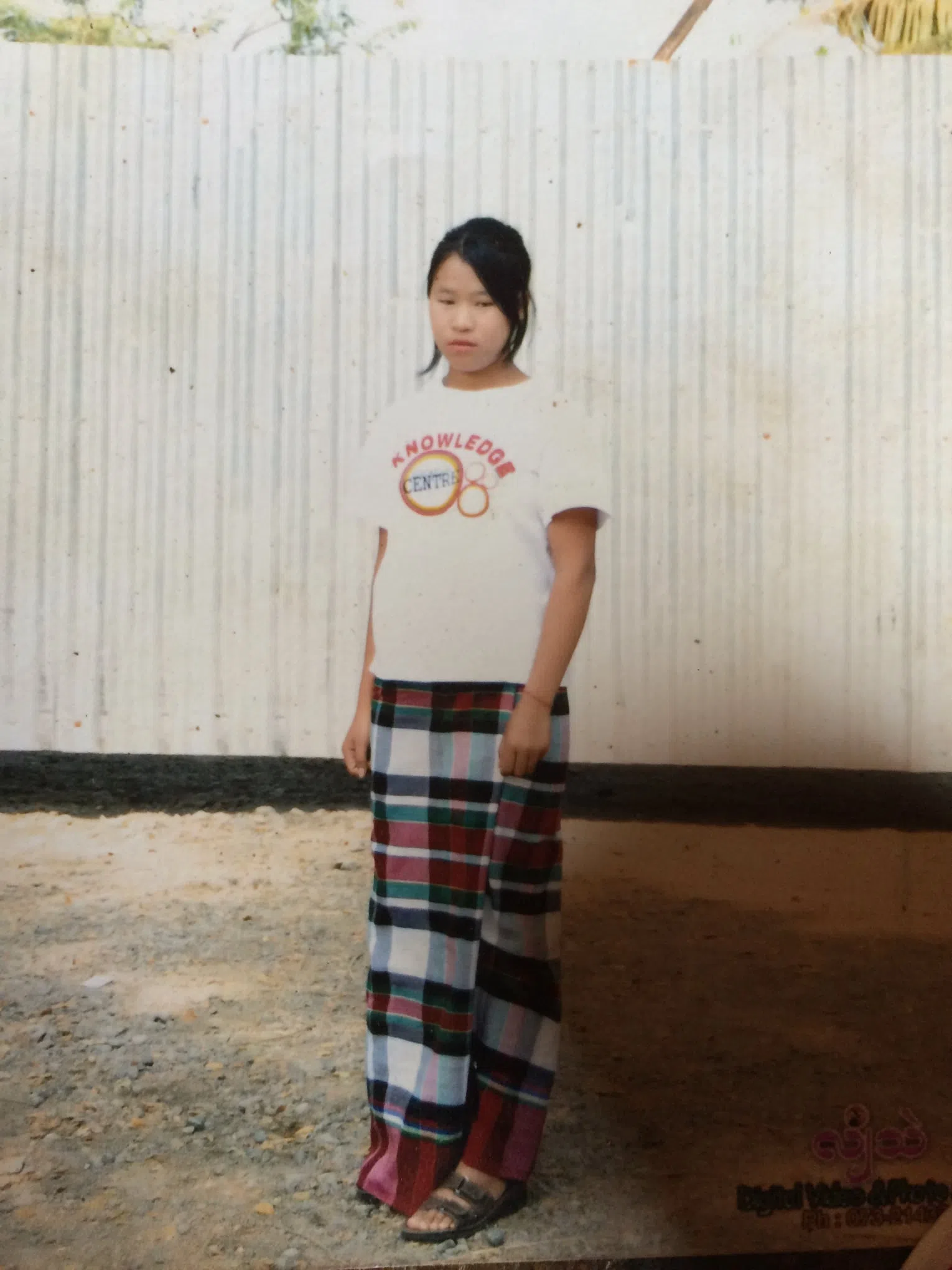True Crimes of Asia: Myanmar maid’s death sparks reform in worker protection but gaps still exist
Sign up now: Get ST's newsletters delivered to your inbox

Gaiyathiri Murugayan (left) had subjected Ms Piang Ngaih Don to months of beatings and deprived her of food.
PHOTOS: LIANHE WANBAO, HELPING HANDS FOR MIGRANT WORKERS
Follow topic:
SINGAPORE - Myanmar national Piang Ngaih Don spent the last 12 nights of her life tied to a window grille
She slept on a bedroom floor with one arm secured with a cord.
She had begged her employer not to tie her, but Gaiyathiri Murugayan told the maid she “deserved” it as she had sneaked out at night to take food from the kitchen.
Gaiyathiri, at the time married to a policeman, had subjected the 24-year-old domestic helper to months of beatings and deprived her of food. In the 14 months she worked for the family, the maid lost 15kg.
Ms Piang Ngaih Don was also forced to shower and use the bathroom with the door open.
But there was only so much her frail body could take.
On July 26, 2016, after being assaulted by Gaiyathiri and her mother Prema S. Naraynasamy, she drew her last breath. Ms Piang Ngaih Don weighed just 24kg when she died.
“I would say (their actions are) not human... not a human mindset,” said Helping Hands for Migrant Workers founder Tin Maung Win of the mother-daughter duo. He was speaking to The Straits Times in the third episode of the True Crimes Of Asia podcast series
The ordeal she suffered in the last 35 days of her life was captured on surveillance cameras
Chelvam, 44, who was suspended from service on Aug 8, 2016, faces multiple charges in connection with the abuse. Prema, 64, who often stayed with the couple in the flat, was also charged in 2016.
In 2021, Gaiyathiri pleaded guilty to multiple charges of assaulting the domestic worker, with the most egregious being culpable homicide. Gaiyathiri was jailed for 30 years, the longest jail term meted out for a maid abuse case in Singapore, and her mother was handed a 14-year jail sentence.
On Monday, Prema’s sentence was increased by three years
The helper’s prolonged abuse elicited shock and outrage among local and international communities, and changes to increase protections for domestic workers in Singapore were introduced following her death.
However, even with measures in place to prevent such cases from reoccurring, representatives from non-governmental organisations (NGOs) in Singapore say more must be done to end domestic worker abuse.
Coming home
Ms Piang Ngaih Don, a single mother of a three-year-old boy, arrived in Singapore to work for Gaiyathiri and her family in May 2015. It was her first time working in a foreign country.
She left her remote village in Myanmar’s impoverished Chin state, leaving her son in the care of her relatives.
Ms Piang Ngaih Don rarely called home and never complained about her job.
Her family suspected something was amiss only when she called in July, just two weeks before her death, her sister, Ms Ciang Lam Man, told media outlet Al Jazeera in a documentary in 2016.
In the conversation with her sister, Ms Piang Ngaih Don said she was unwell and wanted to return home in August. She also asked if her brother could pick her up from Yangon, which is about 1,000km from their village.
Instead, her brother Pau Sian Mung, then 32, was forced to travel to Singapore to retrieve her body in early August 2016.

Mr Pau Sian Mung was forced to travel to Singapore to retrieve his sister’s body in early August 2016.
PHOTO: ST FILE
The Catholic church worker told Singapore media then: “To lose our sister in the hands of her employer was extremely difficult and painful to comprehend, but our family forgives the perpetrators.
“The law will take its own course.”
In videos posted on YouTube, hundreds of mourners lined the streets to receive Mr Pau Sian Mung when he returned with his sister’s body. They can be seen holding up posters of Ms Piang Ngaih Don and wailing uncontrollably as they reached out to touch her coffin while a priest led the crowd in prayer.
The law takes its course
The extent of the torture Ms Piang Ngaih Don suffered became clear only during Gaiyathiri’s trial, five years after the helper’s death.
Footage of the emaciated domestic worker being grabbed by the hair and shaken like a rag doll was played in court.
There was also footage of Gaiyathiri pouring cold water on Ms Piang Ngaih Don and slapping, pushing, punching, kicking and stomping on her while she was on the ground.
She also hit the domestic worker with objects like a plastic bottle and metal ladle and pressed a heated steam iron to the maid’s forearm.
Ms Piang Ngaih Don’s meals often consisted of sliced bread soaked in water, cold food straight from the refrigerator or some rice at night.

Ms Piang Ngaih Don, a single mother of a three-year-old boy, arrived in Singapore to work for Gaiyathiri and her family in May 2015.
PHOTO: FACEBOOK
In the hours before her death, Ms Piang Ngaih Don was kicked and stomped on several times. She was also grabbed by the hair and choked repeatedly.
An autopsy found 31 recent scars and 47 external injuries all over the maid’s body.
It found that the repeated choking of the victim had led to oxygen deprivation to the brain, resulting in death.
The violent nature of Ms Piang Ngaih Don’s death shocked the nation.
Then-Minister for Manpower Josephine Teo and Minister for Home Affairs and Law K. Shanmugam condemned the actions of the helper’s employers
“People who seem ordinary are capable of extraordinary evil, and there are two pillars in any society to keep evil in check. One is education. Two, we need rule of law to keep such evil in check,” said Mr Shanmugam.
He added: “The law has to come down with full force when the rules are broken.”
Mrs Teo called the case appalling and absolutely unacceptable, saying: “There is no place for abuse against (foreign domestic workers) in Singapore...This is not the kind of society we are, and we will do what we can to protect (foreign domestic workers) while they are here.”
She added that while there are safeguards in place, Singapore must do better to prevent such an egregious incident from ever happening again.
Humanitarian Organisation for Migration Economics (Home) senior manager of research and advocacy Jaya Anil Kumar said: “Especially after... the details and the circumstances that led to her death came to light, there was a very strong sense as a society that we need to do more to protect our domestic workers.”
Steps to stop abuse
Since 2021, a host of measures to protect domestic workers have been introduced.
These include random house visits by Manpower Ministry-appointed officials,
More recently, the Government has made it mandatory for domestic workers in Singapore to have at least one rest day a month,
Doctors must also conduct more thorough checks for domestic workers during mandatory check-ups, including recording their body mass index and looking out for signs of suspicious or unexplained injuries.
But NGOs that ST spoke to said while these measures have helped the authorities to detect some cases of abuse, instances of mistreatment or violence still occur.
Mr Tin Maung Win, whose NGO runs a hotline for migrant workers from Myanmar, said he still gets calls for help from domestic workers daily.
Some calls involve employers not providing enough food or scolding the workers, while other complaints involve employers preventing them from seeking new employment with another household.
Both Mr Tin Maung Win and Ms Kumar said the requirement where current employers have to approve a helper’s request to transfer employment skews the balance of power in favour of employers.
Ms Kumar said: “Inherently, a lot of domestic workers are still very scared, even if something’s wrong – if, for example, they are being illegally deployed or there’s some form of abuse that’s happening.”
She added that at the heart of the matter is the need to respect the rights of domestic workers and treat them as people.
Giving domestic workers the same rights as all other employees in Singapore will help change perceptions, she said.
This should include a maximum number of working hours a day.
“From what we see through the years of case work we’ve done... there’s this propensity to treat domestic workers as lesser beings, as someone who does not deserve the same kind of treatment that you would give your family, your friends, your colleagues,” said Ms Kumar.
Under MOM’s Household Services Scheme,
There are currently about 140 companies that cater to more than 21,000 homes.
This allows workers from Cambodia, India, Myanmar, Sri Lanka or Thailand to work part-time at multiple households. They do not live in the homes they work at.
Companies currently advertise cleaning rates of between $20 and $30 an hour. A pilot is under way to include basic child-minding and elder-minding services.
But Ms Kumar believes that the live-out option should be made available to all 268,500 migrant domestic workers here by allowing them to rent accommodation with other helpers.
This would involve employers having to pay domestic workers more for them to afford rent, but Ms Kumar believes that this is a price worth paying to stem domestic abuse in Singapore.
She said: “A lot of the measures that we put in place... give them an avenue to seek help but sometimes the measures may not be timely enough, and sometimes the helpers are still scared to still reach out because they do not know what’s going to happen to them.”
On Ms Piang Ngaih Don’s torture and death, Ms Kumar said: “It shouldn’t take something so tragic for us to make our laws better...
“We should recognise where the loopholes are and do our best to plug them where we can.”


